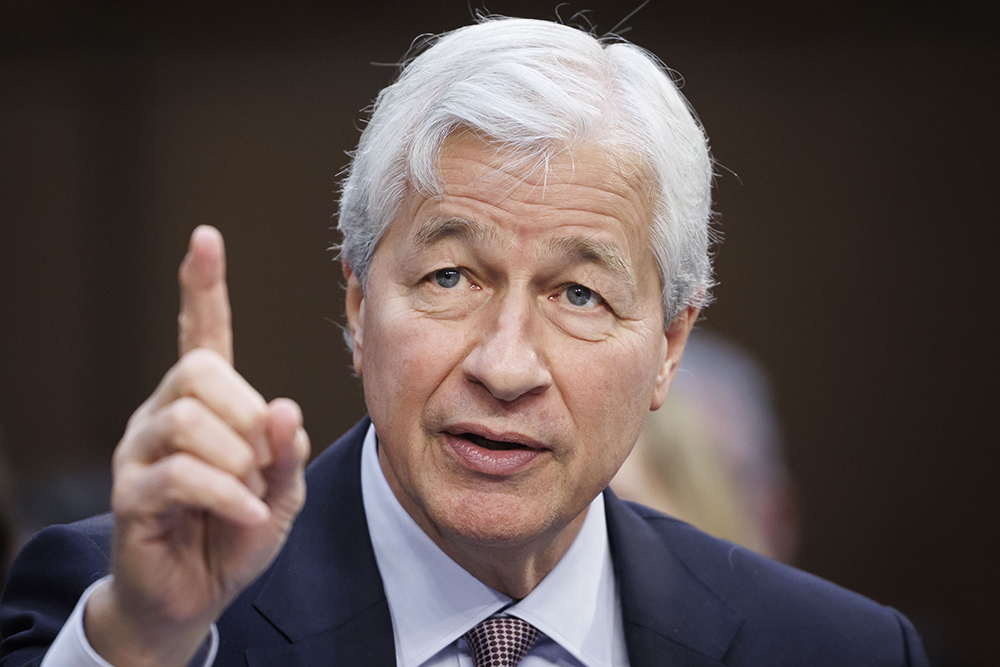
摩根大通(JPMorgan Chase)的首席執(zhí)行官杰米·戴蒙再次表示不會再談?wù)摫忍貛牛˙itcoin),。
在瑞士達沃斯接受美國消費者新聞與商業(yè)頻道(CNBC)采訪時,,戴蒙明顯認(rèn)為主持人的問題可笑。他宣稱,,他發(fā)誓再也不會就加密貨幣發(fā)表意見,。在被問到上周獲得美國證券交易委員會(Securities and Exchange Commission)批準(zhǔn)的新比特幣交易所交易基金(Bitcoin ETF)時,戴蒙打斷了美國消費者新聞與商業(yè)頻道的主持人和《紐約時報》(New York Times)的專欄作家安德魯·羅斯·索金的話,。
他在演播室主持人索金,、喬·凱爾寧和貝基·奎克的笑聲中說道:“有一件事情很重要,,那就是這將是我最后一次在美國消費者新聞與商業(yè)頻道談?wù)撨@個話題——我發(fā)誓?!?/p>
這種惱怒的態(tài)度,,已經(jīng)成為戴蒙談?wù)摫忍貛艜r的標(biāo)志性立場。他早在2017年就曾經(jīng)表示,,再也不會談?wù)摫忍貛拧?/p>
戴蒙繼續(xù)批評比特幣,,稱“它一無是處”。
他說:“我愿意稱它是寵物石,?!?/p>
然后戴蒙糾正自己的話,說他認(rèn)為比特幣實際上有一些用處,。他指出,,比特幣能夠用于各種非法用途,例如洗錢,、欺詐,、偷稅或者支付嫖資等。
有證據(jù)可以支持戴蒙的說法,。美國政府問責(zé)署(Government Accountability Office)發(fā)現(xiàn),,在其2021年6月的報告調(diào)查的27個商業(yè)色情網(wǎng)站中,有15個網(wǎng)站接受數(shù)字貨幣支付,。此外,,聯(lián)合國(U.N.)警告,加密貨幣平臺經(jīng)常被東南亞的犯罪集團用于洗錢,。
盡管有這些擔(dān)憂,,加密貨幣市場在經(jīng)歷了2022年瀕臨崩潰的“加密貨幣寒冬”之后,最近幾年的表現(xiàn)一直非常強勁,。2023年,,整個加密貨幣行業(yè)的市值增長了95%,盡管其規(guī)模依舊比新冠疫情期間的史上最高點低35%,。美國證券交易委員會最近批準(zhǔn)的交易所交易基金也是一個信號,,表明加密貨幣正在成為一種合法的金融資產(chǎn)。雖然戴蒙反對持有加密貨幣,,但許多散戶卻是加密貨幣的粉絲,。2022年的一項研究發(fā)現(xiàn),36%的千禧一代和20%的成年人持有加密貨幣,。
戴蒙以往關(guān)于比特幣的言論
多年來,,戴蒙從不掩飾他對加密貨幣的厭惡。他稱呼比特幣的投資者是“蠢貨”,,甚至威脅炒掉被發(fā)現(xiàn)投資比特幣的員工,。他還說比特幣是一種“被人為炒作的欺詐”和“浪費時間”。在12月的參議院聽證會上,,戴蒙表示,,如果他有決定權(quán),他就會“將加密貨幣市場徹底關(guān)閉”,,這讓加密貨幣鷹派參議員伊麗莎白·沃倫(馬薩諸塞州民主黨)感到意外,。
貝萊德(BlackRock)和高盛集團(Goldman Sachs Group)等大型金融公司也曾經(jīng)持有類似的立場,但隨著加密貨幣變得越來越受歡迎,,回報越來越豐厚,,這些公司紛紛改變了想法。2020年,,高盛發(fā)布的分析報告解釋了為什么它認(rèn)為比特幣不屬于一種資產(chǎn),,這份報告在華爾街和幣圈被廣泛轉(zhuǎn)發(fā)。雖然高盛的投資主管對比特幣依舊持謹(jǐn)慎的態(tài)度,,但其首席執(zhí)行官蘇德?。―avid Solomon)卻表示,高盛有意收購低價加密貨幣公司,。
在美國消費者新聞與商業(yè)頻道要求戴蒙評論向客戶提供加密貨幣產(chǎn)品的公司時,,他同樣給出了不屑一顧的回答。
他告訴索金:“首先,,我不在乎,。請別再談?wù)撨@種垃圾了?!?/p>
貝萊德的首席執(zhí)行官拉里·芬克曾經(jīng)與戴蒙一樣,,是比特幣的堅定批評者,他擔(dān)心比特幣除了用于犯罪活動以外,,沒有太多用處,。2017年,芬克曾經(jīng)稱比特幣是“洗錢的指標(biāo)”,,它唯一的好處在于,,證明了特定金融犯罪的需求有多大。但后來芬克改變了立場,。到2020年,,他認(rèn)為比特幣將會發(fā)展成一個全球性市場。到本月,,比特幣現(xiàn)貨交易所交易基金被批準(zhǔn)成立時,,全球最大的資產(chǎn)管理公司貝萊德所持有的比特幣數(shù)量在上市公司中排在第三位。
資產(chǎn)管理公司富達基金(Fidelity)很早就開始投資比特幣,。該公司在2014年開始加密貨幣挖礦,,2018年成立了首個加密貨幣交易平臺,。但貝萊德的其他競爭對手,例如全球第二大和第三大資產(chǎn)管理公司道富銀行(State Street)和先鋒集團(Vanguard),,均選擇了遠(yuǎn)離比特幣,。
先鋒集團在2023年12月對彭博社(Bloomberg)表示:“投資加密貨幣沒有可靠的理由。與股票和債券不同,,大多數(shù)加密貨幣資產(chǎn)缺少固有的經(jīng)濟價值,,而且無法生成現(xiàn)金流?!?/p>
這與戴蒙的思路類似,。戴蒙在接受美國消費者新聞與商業(yè)頻道采訪時,對比特幣除了協(xié)助和支持犯罪以外的最終功能多次表示擔(dān)憂,。戴蒙還試圖把比特幣與區(qū)塊鏈區(qū)分開來,。區(qū)塊鏈?zhǔn)篃o需中央機構(gòu)批準(zhǔn)交易比特幣成為現(xiàn)實。比特幣的支持者認(rèn)為,,無需依賴銀行或結(jié)算機構(gòu)就能夠進行交易,,是這種資產(chǎn)的核心優(yōu)勢,這讓它不同于其他任何貨幣或資產(chǎn),。戴蒙認(rèn)為,,區(qū)塊鏈有助于資產(chǎn)或數(shù)據(jù)交換。但他認(rèn)為,,即使在這個話題上,,也已經(jīng)浪費了太多口舌。
戴蒙評價區(qū)塊鏈稱:“它很不起眼,。我認(rèn)為,,我們浪費了太多時間談?wù)撨@個話題?!保ㄘ敻恢形木W(wǎng))
譯者:劉進龍
審校:汪皓
摩根大通(JPMorgan Chase)的首席執(zhí)行官杰米·戴蒙再次表示不會再談?wù)摫忍貛牛˙itcoin),。
在瑞士達沃斯接受美國消費者新聞與商業(yè)頻道(CNBC)采訪時,戴蒙明顯認(rèn)為主持人的問題可笑,。他宣稱,,他發(fā)誓再也不會就加密貨幣發(fā)表意見。在被問到上周獲得美國證券交易委員會(Securities and Exchange Commission)批準(zhǔn)的新比特幣交易所交易基金(Bitcoin ETF)時,,戴蒙打斷了美國消費者新聞與商業(yè)頻道的主持人和《紐約時報》(New York Times)的專欄作家安德魯·羅斯·索金的話,。
他在演播室主持人索金、喬·凱爾寧和貝基·奎克的笑聲中說道:“有一件事情很重要,,那就是這將是我最后一次在美國消費者新聞與商業(yè)頻道談?wù)撨@個話題——我發(fā)誓,。”
這種惱怒的態(tài)度,已經(jīng)成為戴蒙談?wù)摫忍貛艜r的標(biāo)志性立場,。他早在2017年就曾經(jīng)表示,,再也不會談?wù)摫忍貛拧?/p>
戴蒙繼續(xù)批評比特幣,稱“它一無是處”,。
他說:“我愿意稱它是寵物石,。”
然后戴蒙糾正自己的話,,說他認(rèn)為比特幣實際上有一些用處。他指出,,比特幣能夠用于各種非法用途,,例如洗錢、欺詐,、偷稅或者支付嫖資等,。
有證據(jù)可以支持戴蒙的說法。美國政府問責(zé)署(Government Accountability Office)發(fā)現(xiàn),,在其2021年6月的報告調(diào)查的27個商業(yè)色情網(wǎng)站中,,有15個網(wǎng)站接受數(shù)字貨幣支付。此外,,聯(lián)合國(U.N.)警告,,加密貨幣平臺經(jīng)常被東南亞的犯罪集團用于洗錢。
盡管有這些擔(dān)憂,,加密貨幣市場在經(jīng)歷了2022年瀕臨崩潰的“加密貨幣寒冬”之后,,最近幾年的表現(xiàn)一直非常強勁。2023年,,整個加密貨幣行業(yè)的市值增長了95%,,盡管其規(guī)模依舊比新冠疫情期間的史上最高點低35%。美國證券交易委員會最近批準(zhǔn)的交易所交易基金也是一個信號,,表明加密貨幣正在成為一種合法的金融資產(chǎn),。雖然戴蒙反對持有加密貨幣,但許多散戶卻是加密貨幣的粉絲,。2022年的一項研究發(fā)現(xiàn),,36%的千禧一代和20%的成年人持有加密貨幣。
戴蒙以往關(guān)于比特幣的言論
多年來,,戴蒙從不掩飾他對加密貨幣的厭惡,。他稱呼比特幣的投資者是“蠢貨”,甚至威脅炒掉被發(fā)現(xiàn)投資比特幣的員工,。他還說比特幣是一種“被人為炒作的欺詐”和“浪費時間”,。在12月的參議院聽證會上,戴蒙表示,如果他有決定權(quán),,他就會“將加密貨幣市場徹底關(guān)閉”,,這讓加密貨幣鷹派參議員伊麗莎白·沃倫(馬薩諸塞州民主黨)感到意外。
貝萊德(BlackRock)和高盛集團(Goldman Sachs Group)等大型金融公司也曾經(jīng)持有類似的立場,,但隨著加密貨幣變得越來越受歡迎,,回報越來越豐厚,這些公司紛紛改變了想法,。2020年,,高盛發(fā)布的分析報告解釋了為什么它認(rèn)為比特幣不屬于一種資產(chǎn),這份報告在華爾街和幣圈被廣泛轉(zhuǎn)發(fā),。雖然高盛的投資主管對比特幣依舊持謹(jǐn)慎的態(tài)度,,但其首席執(zhí)行官蘇德巍(David Solomon)卻表示,,高盛有意收購低價加密貨幣公司,。
在美國消費者新聞與商業(yè)頻道要求戴蒙評論向客戶提供加密貨幣產(chǎn)品的公司時,他同樣給出了不屑一顧的回答,。
他告訴索金:“首先,,我不在乎。請別再談?wù)撨@種垃圾了,?!?/p>
貝萊德的首席執(zhí)行官拉里·芬克曾經(jīng)與戴蒙一樣,是比特幣的堅定批評者,,他擔(dān)心比特幣除了用于犯罪活動以外,,沒有太多用處。2017年,,芬克曾經(jīng)稱比特幣是“洗錢的指標(biāo)”,,它唯一的好處在于,證明了特定金融犯罪的需求有多大,。但后來芬克改變了立場,。到2020年,他認(rèn)為比特幣將會發(fā)展成一個全球性市場,。到本月,,比特幣現(xiàn)貨交易所交易基金被批準(zhǔn)成立時,全球最大的資產(chǎn)管理公司貝萊德所持有的比特幣數(shù)量在上市公司中排在第三位,。
資產(chǎn)管理公司富達基金(Fidelity)很早就開始投資比特幣,。該公司在2014年開始加密貨幣挖礦,2018年成立了首個加密貨幣交易平臺,。但貝萊德的其他競爭對手,,例如全球第二大和第三大資產(chǎn)管理公司道富銀行(State Street)和先鋒集團(Vanguard),均選擇了遠(yuǎn)離比特幣。
先鋒集團在2023年12月對彭博社(Bloomberg)表示:“投資加密貨幣沒有可靠的理由,。與股票和債券不同,,大多數(shù)加密貨幣資產(chǎn)缺少固有的經(jīng)濟價值,而且無法生成現(xiàn)金流,?!?/p>
這與戴蒙的思路類似。戴蒙在接受美國消費者新聞與商業(yè)頻道采訪時,,對比特幣除了協(xié)助和支持犯罪以外的最終功能多次表示擔(dān)憂,。戴蒙還試圖把比特幣與區(qū)塊鏈區(qū)分開來。區(qū)塊鏈?zhǔn)篃o需中央機構(gòu)批準(zhǔn)交易比特幣成為現(xiàn)實,。比特幣的支持者認(rèn)為,,無需依賴銀行或結(jié)算機構(gòu)就能夠進行交易,是這種資產(chǎn)的核心優(yōu)勢,,這讓它不同于其他任何貨幣或資產(chǎn)。戴蒙認(rèn)為,,區(qū)塊鏈有助于資產(chǎn)或數(shù)據(jù)交換,。但他認(rèn)為,即使在這個話題上,,也已經(jīng)浪費了太多口舌,。
戴蒙評價區(qū)塊鏈稱:“它很不起眼。我認(rèn)為,,我們浪費了太多時間談?wù)撨@個話題,。”(財富中文網(wǎng))
譯者:劉進龍
審校:汪皓
JPMorgan Chase CEO Jamie Dimon is done talking about Bitcoin—again.
In a CNBC interview from Davos, a visibly amused Dimon declared he was swearing off opining about the crypto currency. When asked about the new Bitcoin ETF the Securities and Exchange Commission approved last week, Dimon interrupted CNBC host Andrew Ross Sorkin, also of The New York Times, to say:
“So this is an important thing, this is the last time I’m ever going to talk about this on CNBC—so help me God,” Dimon said to laughs from studio hosts Sorkin, Joe Kernen, and Becky Quick.
That sort of exasperation has become a Dimon staple when discussing Bitcoin. He’s been saying he’ll never talk about Bitcoin again since as far back as 2017.
Dimon continued his criticism of Bitcoin, saying “it does nothing.”
“I call it the pet rock,” he said.
Dimon then corrected himself to say he did think Bitcoin did actually have some uses. They just all happened to be illegal such as money laundering, fraud, tax avoidance, or as payment for sex trafficking, he said.
There is evidence to support Dimon’s claim. The Government Accountability Office found that 15 of the 27 online commercial sex websites it examined in a June 2021 report accepted digital currencies. While the U.N. issued warnings that cryptocurrency platforms are often used for money laundering by criminal groups in Southeast Asia.
Despite these concerns, the market for cryptocurrencies has been exceptionally strong in recent years after a near-death experience during 2022’s “crypto winter.” In 2023, the market capitalization for the entire crypto industry grew 95%, although it’s still down 35% from its all-time high during the pandemic. Also, the SEC’s recent ETF approval is a signal that crypto is becoming a legitimate financial asset. And despite Dimon’s objections to owning cryptocurrency himself, many retail investors do. A study from 2022 found that 36% of millennials and 20% of total adults own cryptocurrencies.
Dimon’s history of Bitcoin talk
Over the years, Dimon has been open about his dislike for cryptocurrencies, calling people who invest in Bitcoin “stupid,” and once threatening to fire any employee caught investing in it. Meanwhile, he called the asset itself a “hyped-up fraud” and a “waste of time.” At a Senate hearing in December, Dimon said if it were up to him he’d “close it down,” earning a surprised reaction from crypto hawk Sen. Elizabeth Warren (D-Mass.)
Other major financial firms like BlackRock and Goldman Sachs had similar positions before changing their minds as crypto became more popular and lucrative. In 2020, Goldman Sachs published an analyst note explaining why it didn’t consider Bitcoin an asset class that was widely shared in both Wall Street and crypto circles. And while its investment chief is still wary of Bitcoin, CEO David Solomon signaled Goldman Sachs would be interested in acquiring bargain crypto companies.
When CNBC asked Dimon about companies that offer crypto products to their clients, he replied with the same dismissiveness he reserved for the asset itself.
“Number one I don’t care,” he told Sorkin. “So just please stop talking about this shit.”
BlackRock CEO Larry Fink was once in Dimon’s camp as a staunch Bitcoin critic, concerned it had limited use beyond criminal activity. In 2017, Fink famously called Bitcoin the “index of money laundering” and that the only it was good for was illustrating how much demand there was for that specific financial crime. Fink would eventually change his tune, though. By 2020, he believed it could grow into a global market. Fast forward to this month, when Bitcoin got the stamp of approval to become a spot ETF and BlackRock, the largest asset manager in the world, owns the third most Bitcoins of any public company.
Fellow asset manager Fidelity was early to embrace Bitcoin. It began mining the cryptocurrency in 2014, before launching its first trading platform in 2018. While BlackRock’s other competitors, State Street and Vanguard, the world’s second and third largest asset managers respectively, have opted to stay away from Bitcoin altogether.
“The investment case for cryptocurrencies is weak,” Vanguard told Bloomberg in December. “Unlike stocks and bonds, most crypto assets lack intrinsic economic value and generate no cash flows.
That line of thinking was similar to Dimon’s, who in his CNBC interview raised repeated concerns over Bitcoin’s ultimate function—aside from, as he said, aiding and abetting crime. Instead, Dimon sought to differentiate between Bitcoin and blockchain, the technology which allows Bitcoin to be traded without the approval of a centralized agency. Bitcoin’s defenders tout the ability to trade the asset without having to rely on a bank or clearing authority as the core benefit that makes it unlike any other currency or asset. Blockchain, according to Dimon, was useful for exchanging assets or data. Although he thought even on that topic enough ink had been spilled.
“It’s very small,” he said of blockchain. “I think we’ve wasted too many words on that.”






